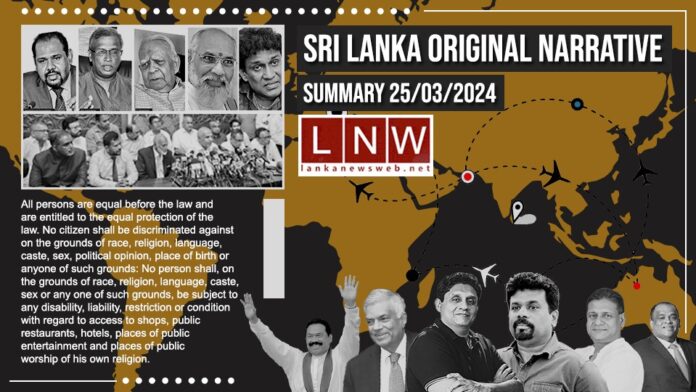- President Ranil Wickremesinghe emphasises the need for comprehensive discussions on healthcare advancements, stressing the integration of modern technology to enhance medical facilities: reaffirms the government’s commitment to empowering individuals for societal progress through healthcare: encourages active participation from medical professionals in shaping a forward-looking healthcare framework, highlighting leadership and government involvement.
- Former President Maithripala Sirisena appears before the Criminal Investigation Department to produce a statement in connection with his recent controversial remarks about the Easter Sunday genocide: Sirisena previously claimed that he has knowledge on the true mastermind behind the attack, which took away more than 270 lives five years ago.
- NPP/JVP Leader MP Anura Kumara Dissanayake says his party opposes the government’s proposed Constitutional Amendments before the Presidential polls: emphasises that the government fears losing power and is delaying elections: assures that the NPP would prevent the implementation of these amendments until after the Presidential election: further discusses potential alliances in forming a government if the NPP fails to secure enough seats.
- Justice Minister Wijeyadasa Rajapakshe issues a gazette allowing English language use in the Commercial High Courts for all proceedings and record-keeping: The decision aligns with the Constitution and aims to improve efficiency, considering the prevalent use of English in commercial activities and the challenges of translation.
- Officials are drafting an economic transformation law to address concerns about potential disruption to the current IMF programme amid political transitions: The legislation aims to safeguard the sustainability of the IMF-supported reform programme, valued at US$3 billion: Despite commendable progress noted by the IMF, opposition parties have vowed to renegotiate the agreement if elected: Finance State Minister Shehan Semasinghe plans to introduce the bill in Parliament in May, ensuring continuity and legal backing for the reform programme regardless of political changes.
- Sri Lanka’s official unemployment rate drops to 4.3% in the 4Q23’, down from 4.7% in the previous quarter, reflecting a growing economy: GDP surges by 4.5% in Q4, a significant rebound from 1.6% in Q3, indicating economic recovery after severe challenges in 2022: The country now earns $825 million monthly from remittances and tourism, signalling progress: Despite this, emigration has led to talent shortages as companies resume hiring: The labour force participation rate fell to 47.1%, indicating tight labour market conditions compared to OECD countries.
- The Central Bank plans to revise its regulatory sandbox to attract more fintech players after minimal engagement in four years: Challenges such as costly audits deterred participation: The aim is to streamline regulations to encourage experimentation, taking inspiration from successful models like India’s Reserve Bank.
- Belarusian President Lukashenko praises Sri Lanka’s economic reforms and expresses Belarus’s support for them: emphasises Belarus’s willingness to enhance bilateral cooperation across multiple sectors, including agriculture and technology.
- Badulla Hospital transitions into a Teaching Hospital alongside the Faculty of Medicine: A ceremony was held at the Badulla Library Auditorium to welcome 50 new medical students, during which the Nimal Siripala de Silva Foundation donated stethoscopes to each student.
- Sri Lanka’s Dhananjaya de Silva and Kamindu Mendis both score centuries, leading Sri Lanka to a dominant position against Bangladesh in the first test in Sylhet: SL set Bangladesh a challenging target of 511 runs after amassing 418 runs in their second innings: With Bangladesh struggling at 47 for 5 wickets, SL’s victory seems imminent: Dhananjaya and Kamindu’s record-breaking partnership significantly strengthen SL’s position.


